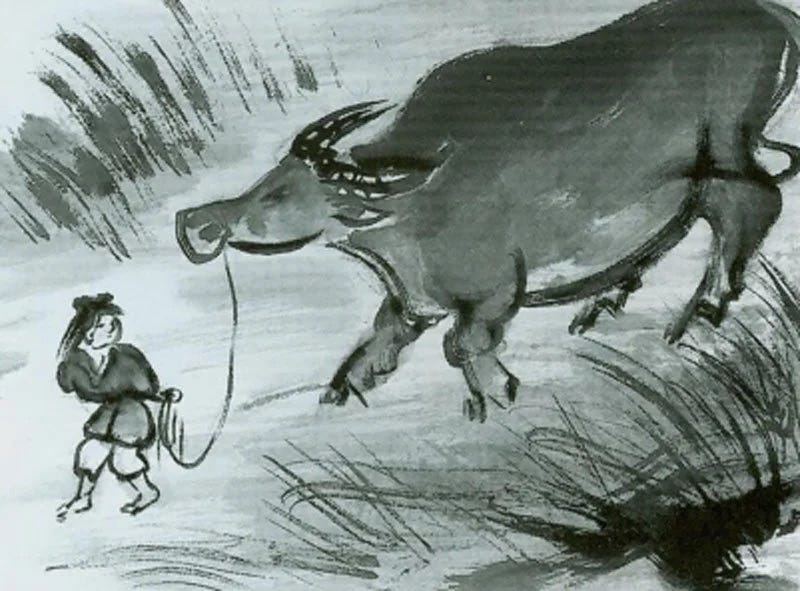Following our earlier conversation about Ultraspeaking and Vajrayana, we add adult developmental stage theory to the mix: three transformational frameworks in synergy.
We recorded this when Charlie was in Berlin on a Chinese martial arts retreat. Charlie had had been away from home for more than a month, after teaching several Vajrayana retreats in New York. The video signal was not good, so this is audio only.
Transcript
Charlie: I was thinking about the kinds of changes that occur through this kind of practice that we’re talking about, changing ways of being and communication; and how that can be seen through a lens of adult development as well, which is something that you and I are both very interested in, that I’ve trained in as well.
I think both Ultraspeaking and Evolving Ground have the potential to facilitate development from what you might call a socialized mode into self-authorship; and for some, from self-authorship into self-transforming mode. Or at least to play a part in that developmental journey.
David: Just to interrupt, the modes you’ve just described are the ones labeled three, four, and five in many systems, like Robert Kegan’s.
Charlie: Yes, that’s right. So in socialized mode, one of the characteristics of finding yourself in that way of being—which we all do in certain contexts—is a heightened concern with how others might think of me, or more emphasis on fitting into an external, accepted, rightness or role, like that is the right role, and it would be wrong to behave contrarily to that. So these are different ways in which a socialized mode can constrain a way of being.
And Ultraspeaking facilitates exploding through that, because you can practice putting aside what other people think of me, you can become more and more aware of how you constrain yourself by concern for what other people think, and practice stepping into a mode of not worrying so much about that.
And in Evolving Ground, we do the same thing in our personal autonomy module, with very different exercises, very different practices of awareness. We may bring some self-reflection practices, or pair work into that, but we’re doing the same thing. We’re facilitating this move away from, limiting concern with “How do I look to other people? What what are other people thinking of me here?” Having the confidence to simply say it how it is, or express what’s going on internally without having to fit in.
So that is one way that the move from more socialized into a more self-authored, more self-principled, self-confident, autonomous way of being is facilitated through both those methods.
And then, from self-authored, as you move from a self-authored, or in the Kegan framework that would be a stage four way of being, which is very systematic, predictable in some ways, you know what you’re going to say, you got it all planned out. Now, if you approach Ultraspeaking and you’re in that way of life, it can be very challenging to have that sense of certainty uprooted in a good way, actually put yourself on the line and go into a situation where you, you cannot be certain how you’re going to do, or what’s going to crop up on the timer, or it can really help just push a little bit beyond that almost over-certain, overconfident—
David: I saw that when I did the brief taster course. There were some people who really wanted to give a talk, with a series of bullet points, and they were going to do that no matter what. And at some point, they broke through, because they realized that actually was not going to work given the format, right? And they had to do something different.
Charlie: It’s so interesting, because the way that that happens experientially is you realize you have— I had the experience of, “Oh! People experience me-in-that-mode as somewhat kind of disconnected.” And I felt that disconnection myself. I felt almost like a glitch with reality. It’s like the jigsaw piece, you think that everything’s fitting in very neatly. And suddenly you have this new perspective that, “Oh, I’m imposing my thing on reality. I’m like, I’m doing my thing.” And all of that melts away. It doesn’t have to be like that. And that is the move from structured, systematized imposition on the world into a more fluid, interactive way of being.
That, that is very moving indeed. Very moving. I, you know, I can feel myself choking up now even thinking about how opening and liberating that is.
It is moving. You know, I’ve seen so many people go through that kind of transformative process, both with Evolving Ground and with Ultraspeaking.
David: I see that also in what I do, a lot of tech people who at some point realize that their rationalism and their principles and their certainty about how things are and should be— it can crumble and be devastating, but it can also just be a, “Ahhh…”—
Charlie: Yeah.
David: —a letting go, a relaxation, a realization that things are much bigger than you had thought, and much more excitingly vivid than the world view in which everything fits together neatly in some jigsaw puzzle that you learned in computer science undergraduate courses.
Reality is, is, is so real and, and so—
Charlie: Squishy.
David: Yeah. Well, it’s squishy and it’s got sharp pointy bits as well, and it’s—
Charlie: Yeah.
David: You just want to lick the whole thing!
Charlie: That’s very tantric.
David: I mean, I use the word “nebulosity,” which is a step beyond squishy. It’s just cloud-like. And then there’s almost nothing there; but yet it kind of swirls around in patterns sometimes. If you’re actually walking through fog, it’s not uniform, it’s ultimately squishy, you can usually not feel it at all.
Charlie: Yeah. Squishy has a playfulness to it as well.
When I look back over my own change, and actually how difficult that was at times, the hard stuff came first. The walking through fog and the, uh, the, I mean, the drop into awful, awful, uh, loss of some sense of meaningful communication.
That was the, the fog-like experience that I, I kind of sort of knew that I would move through that in some way. And, you know, we’re talking about, uh, an experience from years back way before, um, Evolving Ground and Ultraspeaking, but the fog-like quality of that — cognitively, but not only cognitively, it just in experience, like literally one day to the next, not, not having any clear direction or way forward.
All of that came before the playful capacity to dance with whatever happens and, you know, “whichever way it goes, may it go that way,” and moving into the more vivid, vibrant— uh, I’m being metaphorical here, but it actually felt that way as well.
David: Yeah.
I think we might do a whole podcast on this, if you’re up to it at some point; but in terms of adult developmental theory, I would characterize what you went through as a classic stage 4.5 nihilistic confusion, depression; and it was remarkable seeing, being with you through that, and seeing how it went. And I was trying to be as supportive as I could, with limited ability. I think.
Charlie: Well, also we were on separate continents for a long period of time.
David: A lot of it. Yeah, right. Yeah.
Charlie: Yeah. And you were, you were core support for me through that process. I, I intentionally self-isolated, I think as well.
David: Yes. That’s why it was difficult. And I think that’s a very natural thing to happen at that phase. Where you have understood that you can no longer be how you were, but you can’t yet see what the next better possibility is. At best, you’re very confused. At worst, one can be very depressed; and a lot of what I do is trying to help people through that.
Charlie: Same here, now. A lot of my coaching ends up facilitating that process. Hopefully, you know, I don’t think it has to be depression, and actually I wouldn’t characterize my own process as depression, so much as just misery. I was just really, really unhappy for a long time. Which is not the same as depression.
David: Mm hmm.
Charlie: And even in that I enjoyed localized contextual experience. And I think that actually is how I moved through that as well.
David: Yes, that is how you get out of it. Find things to enjoy. Even if they don’t seem meaningful in a larger context. And then you find the meaning in those, and then that spreads.
Charlie: Yeah.
David: We tried to record a podcast about helping STEM people deal with this, more or less.
Charlie: Right? Yeah, we did. And we did do a recording, right? We did record it.
David: It didn’t work out very well. We’ve gotten better at this process, although I need to do a lot more Ultraspeaking practice.
Charlie: It’s nice when we’re in the same room, you know, not just the same Zoom “room,” but the same physical room.
David: I miss you.
Charlie: I miss you. It strikes me that’s actually quite a funny thing to say when we’re here in real time together. I miss your physical being.
David: Well, it is not the same. We spent a lot of years of our relationship being forced to be on different continents by circumstances, and we didn’t even have, you know, Zoom then. It was…
Charlie: We both enjoy being together, and being alone together.
If you don’t enjoy your own company, and if you can’t enjoy being alone, then there’s always going to be some kind of neediness in communication with others in relationships that you build over time with others. So one of the practices that I’ve been suggesting to people: “What’s the longest you’ve been on your own for?”
That also is an aspect of the whole move from socialized or stage three mode into the stage four, self-authoring mode. There’s some sense of self confidence, self trust, self reliance, that actually I don’t think it’s really possible to have, without having experienced liking your own company. You can partially experience autonomy and authorship without knowing that, because you can have a confidence in your own principles, or a confidence in differentiating self. But unless you’ve really leaned into that extreme of possibility in terms of socialized context, then there’s some experience that is not yet known there.
Now I’m thinking of a parallel with the Four Naljors practice. Opening Awareness facilitates moving into an experience of “emptiness” or “spacious clarity,” which is at an extreme end of the range of possibilities: nothing going on in mind. It’s like you really move into experiencing something separate and distinct, in order to get a flavor for what that is.
And then with Moving Awareness, you’re moving into a very different experience, in order to get a sense of what is distinct there.
I am so going off on tangents!
David: Well, there’s a parallel here. The move into emptiness, and the move into being alone; and then the move back into form, but with the recognition that it is empty: this is like the Ox Herding pictures, which is a classic Zen metaphor. You first you go on the path of emptiness; you go looking for emptiness; you find emptiness. And then you bring emptiness back to the town. The metaphor for emptiness is the ox. You bring emptiness back into the town and you reenter society. So that motion is the motion of the Four Naljors also.
Charlie: Right. Right.
David: And it is the experience of solitary retreat; and that experience of returning to society after you’ve done intensive retreat can be very disorienting, and the natural thing to try to do at that point is to return to habits, and snap back into your former way of being as quickly and thoroughly.
Sometimes you can’t; it depends on how intensively you’ve been practicing. If you’ve been practicing really intensively for a long time, you can’t. Everything breaks down, and you can’t actually fulfill your habitual role anymore.
There’s an intermediate position where you’re not snapping back into the role and you’re not unable to cope, but you see how you’re being, and how the world is, with new eyes, because you no longer are applying habitual interpretations to everything constantly.
Charlie: Right. And so you see your interactive patterns coming back online, and you watch that, or you experience that happening with a new kind of awareness. We’ve had a lot of conversations with people post-retreat, in especially Vajra Retreat in Evolving Ground, where that re-enculturation— Because each group retreat has its own culture, and its own intentional culture as well. And the move back into wider society can be a difficult integration. It can be a marvelous integration as well, but it’s not predictably so. We do a lot of work on how to move into that process.
And now I’m thinking back to our conversation about moving from self-authoring certainty into that fog, of nebulosity and meaninglessness, and how that in a way is parallel too. There’s a similar move there. Suddenly the ground is taken out from under you, and then as you come back into new meaning-making, you’re finding your way somehow. You cannot fit back into old habits. You can feel yourself grasping at that, and it doesn’t work. And so something new has to come online.
Anything else before we…?
David: No. Yeah, no, I think we’re done. I’m glad you’re enjoying Berlin.
Charlie: Oh, yeah. Oh, I love Berlin. Oh, wow. I’ve just been wandering around today, just going to different parks and walking to the center and Museum Island. Oh, god, it’s beautiful. Really enjoyed it here.

















Share this post